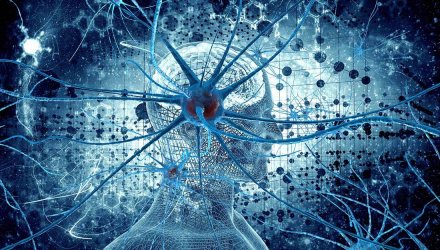The way the brain works, in general, is when neurons fire, anywhere, all the currents from firing eventually go to the center of the brain or thalamus region. The same is true for sensory signals, even those from the body and all the individual cells of the body near sensory nerve endings. The thalamus is the central switching station. It receives global signals and then feeds back to all parts of the brain and body, depending on the needs and circumstances. The thalamus is most wired part of the brain; most complex or zone of highest entropy. The software aspect of the thalamus is called the inner self, while the thalamus proper is this very complex hardware.
The ego; software, appears to be more centered in the hardware called the cerebellum. The cerebellum account for about 10% of the brain's mass, but has 80% of the neurons of the brain; most neuron dense area. The cerebellum is responsible for smoothing movement and timing, as well as the processing of memory, language and speech, among other tasks. This utility is perfect for the needs of the ego software; speech, mannerism, body language, movement and memory recall. It is also wired well with the thalamus, which is nearby.
All natural animals benefit so much by their cerebellum, in terms of their precise animal movements, associated with each species; cat (thalamus/cerebellum wiring and coding). The early human ego would worship the animal spirits connected to each species cerebellum coding; animal movement, coordination and fighting. Learn to mimic the animals; thalamus suggestion to the ego. This also suggested the cerebellum as the place for ego central. Controlling motion was key to building civilizations; jobs, crafts, skills, dance and war.

Cerebral cortex neurons are different in that the branches have sheathing, which take up more space. This sheathing acts as insulation to allow cerebral neuron signals to stay more distinct; clean signals, such as for distinct memory. The cerebellum neurons do not have this sheathing and take up less space. This allows more neutron density as well as the lateral bleeding of signals, which contribute to the averaging and smoothing of motion. This lateral bleeding is also how the ego can impact movement by thinking command lines. We may use the frontal lobe to visualize. These current then go to the thalamus which then feedback, to the cerebellum, and body, since the desired need is motion; inner self and ego.
One can also sit quietly and not use the cerebellum for any action, just thinking to fire cerebral neurons. These cerebral currents go to the thalamus, which then feedback to the cerebral and cerebellum for body sensations; gut feeling for the ego, and cerebral processing; new ideas. Consciousness can tweak these loops to gain feedback and map out the inner self software via feedback inductions within the frontal lobe.
The logic behind consciousness is connected to entropy. Entropy is not hardware but tweaks hardware; adds complexity. Entropy is like a natural form of generic software, that can tweak the pliable organic hardware matrix, to greater complexity. The 2nd law states that the entropy of the universe has to increase. This is odd, in the sense that energy wants to decrease; go from highest to lowest energy, but entropy wants to increase and naturally goes from lower to higher. This is very useful and needed for consciousness.
The neurons are designed to pump and exchange cations, with this action lowering cationic entropy; goes the opposite of the 2nd law. This is very energy intensive and uses 90% of the neurons energy budget. When neurons fire, the entropy is allowed to increase again, with this increase amplifying, via hardware, all the way to the thalamus. As a very loose visual analogy the neuron compress an entropy ball. When the neurons fire, the ball starts to expand, flowing in the best direction to achieve maximum expansion; thalamus; most complex means highest entropy state.
If these currents were due to energy, it would start off high and fizzle to nothing; big to small. But entropy does the opposite, going from small to larger as it propagates, with the maximum complexity of the thalamus, its final expansion; bursting at the seams feedback. This increasing entropy current impacts the hardware as it passes, since it needs the hardware to express itself. This is getting closer to consciousness, which is more about the thalamus feedback; overflow, which can altered things in real time; exceed the hardware program.


